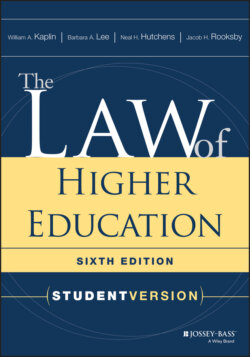Читать книгу The Law of Higher Education - William A. Kaplin - Страница 17
Recommendations for Using the Student Version and Keeping Up-to-Date
ОглавлениеThere are some precautions to keep in mind when using this book. The legal analyses throughout the book, and the practical suggestions, are not adapted to the law of any particular state or to the circumstances prevailing at any particular postsecondary institution. The book is not a substitute for the advice of legal counsel, nor a substitute for further research into the particular legal authorities and factual circumstances that pertain to any legal problem that an institution, administrator, student, or faculty member may face in real life. Nor is the book necessarily the latest word on the law. There is a saying among lawyers that “the law must be stable and yet it cannot stand still” (Roscoe Pound, Interpretations of Legal History, p. 1 (1923)), and the law moves especially fast in its applications to postsecondary education. Thus, we suggest that instructors and students keep abreast of ongoing developments concerning the topics and issues in this book. Various aids (described below) are available for this purpose.
First, we maintain a website, hosted by the National Association of College and University Attorneys (NACUA), Washington, D.C. (www.nacua.org), on which we announce or post pertinent new developments, keying them to this Student Version as well as to the full 6th Edition. For further information on the website and the supplements, see page vii in the front matter of this book.
Next, there is another, very helpful, website: the Campus Legal Information Clearinghouse (CLIC), http://counsel.cua.edu, operated by the General Counsel's Office at The Catholic University of America in conjunction with the American Council on Education, that includes information on recent developments, especially federal statutory and federal agency developments. In addition, there is a legal reporter that reprints new court opinions on higher education law and provides commentary on recent developments: West's Education Law Reporter, published biweekly by Thomson/West Publishing Company, St. Paul, Minnesota.
For news reporting of current events in higher education generally, but particularly for substantial coverage of legal developments, instructors or students may wish to consult the Chronicle of Higher Education, published weekly in hard copy and daily online (http://www.chronicle.com); or Inside Higher Ed., published daily online (http://insidehighered.com).
Other resources will be helpful not only for keeping abreast of recent developments but also for identifying pertinent research. Higher Education Abstracts provides information on conference papers, journal articles, and government and association reports; it is published quarterly by the Claremont Graduate School, Claremont, California (https://onlinelibrary.wiley.com/journal/21501092). The database of the Educational Resources Information Center (ERIC) (http://www.eric.ed.gov), sponsored by the U.S. Department of Education, performs a similar service encompassing books, monographs, research reports, conference papers and proceedings, bibliographies, legislative materials, dissertations, and journal articles on higher education. In addition, the IHELG monograph series published each year by the Institute for Higher Education Law and Governance, University of Houston Law Center, provides papers on a wide variety of research projects and timely topics.
Two specialty journals provide extended legal analysis on recent developments as well as classical concerns: the Journal of College and University Law, published quarterly by the National Association of College and University Attorneys (NACUA) and focusing exclusively on postsecondary education; and the Journal of Law and Education, which covers elementary and secondary as well as postsecondary education, and is published quarterly by Jefferson Law Book Company, Cincinnati, Ohio.
